The Christmas I’ll Never Forget
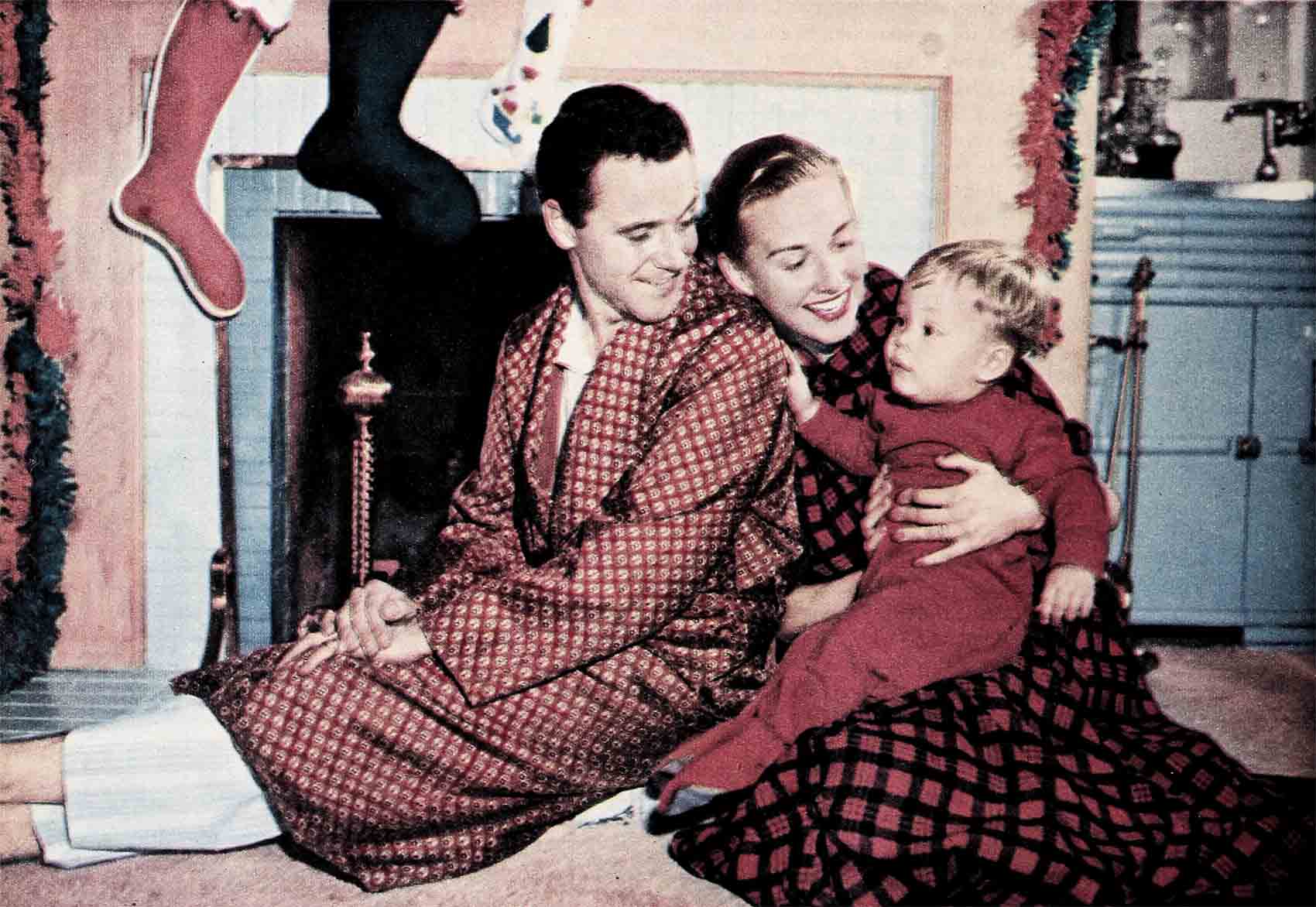
The air was bristling with Christmas spirit and the shops down Wilshire Boulevard were decked with holly and filled with carols. The lights in the windows, having just been turned on, added even a warmer glow to the holiday shopping. Jack Lemmon, struggling behind an awkward package, tried to maneuver the revolving door, finally gave up. In despair he put his packages down on the floor in an effort to reorganize. Photoplay’s reporter nabbed him with his packages down; it was the only way to see him in this busy holiday season.
“What was your most unforgettable Christmas?” we asked.
“Last one,” flipped Jack without a minute’s hesitation. “It was our first Christmas in our first home with our first baby. (He didn’t need to add—his first career was booming.) I remember we had mums from my garden on the table as the Christmas centerpiece. I gave Cynthia a new shining Ford station wagon—a pretty fabulous gift,” emphasized Mr. Lemmon. “And it was Chris’ first Christmas. He was six months old and what a delight. He pulled the tree off its base, chewed on the colored ribbon and tinsel, messed up the presents under the tree. He gurgled and laughed in appreciation—completely delighting his proud parents and grandparents. What’s more, he was nice enough to show that he enjoyed our gift of an oversized Teddy bear. Every time we took it away from him he’d bawl. I’ve been listening to ‘Christmas is for children’ all my life, but not until we had Chris did I really understand what it meant.”
Piper Laurie found something Christmas 1951 in Korea. She was away from her family, friends, gifts and celebrations. She was on a three-week tour of the rear areas of Korea, visiting and entertaining at hospitals.
“It was Christmas night and we were able to wangle our way up to a front position along with a chaplain,” says Piper. “In a bleak isolated section, we found the camp and a group of about twenty men came to greet us.
“While we stood there talking, I felt something brush against my hair and I turned around sharply. There stood a shy-looking sergeant, who rather embarrassedly apologized. ‘I just wanted to touch your hair,’ he said. ‘It feels so good and smells so nice.’
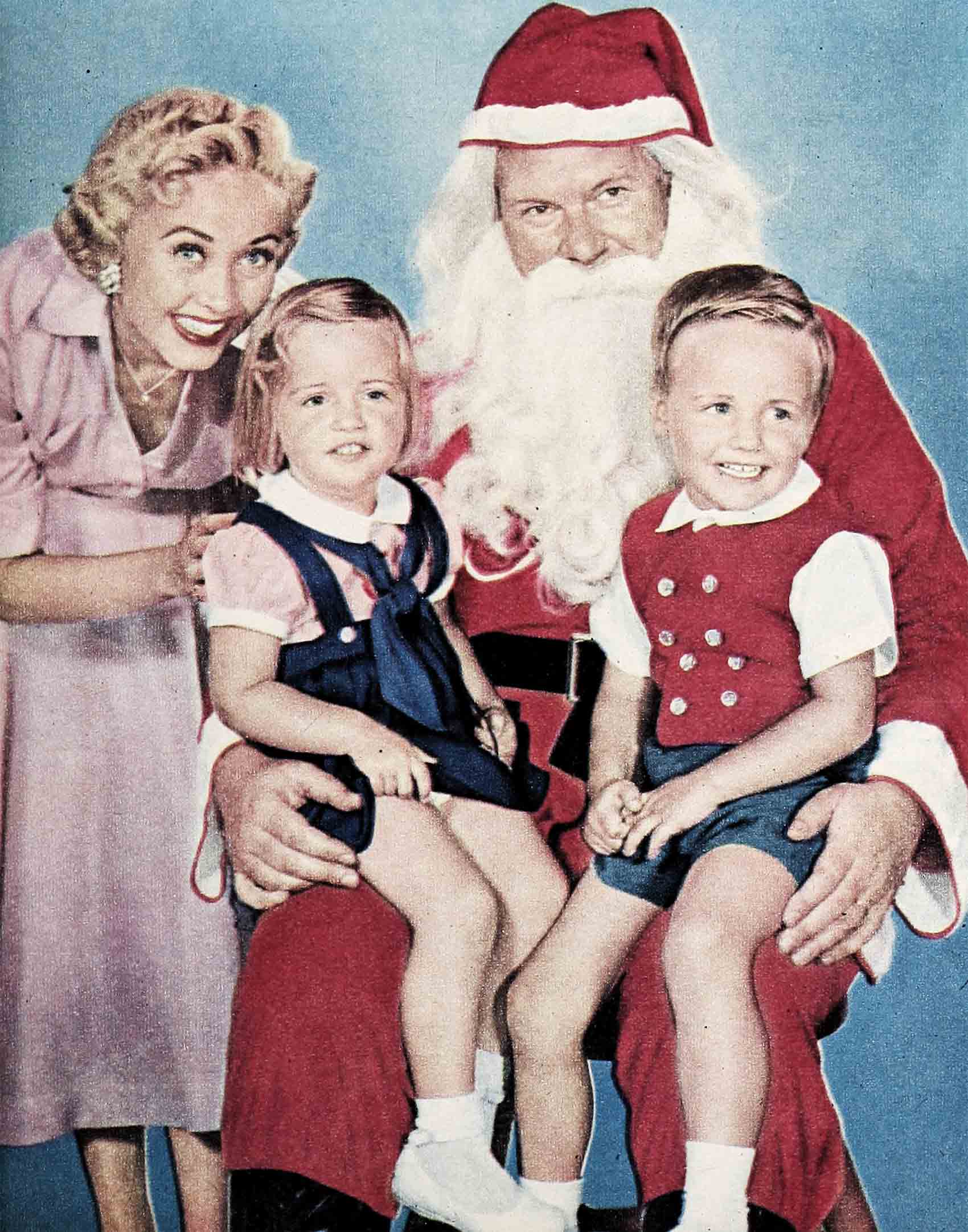
“I couldn’t say anything, I was so touched. But I’ll never forget that boy nor the tenderness of the moment.”
Both for Jane Powell and Vera-Ellen, “Childhood Christmases were the best.” Vera-Ellen fondly remembers a Christmas spent at her Grandmother Robe’s farm in tiny Wadema, Minnesota. “It was below zero and the snow so deep you had to dig your way to the barns at milking time,” says Vera-Ellen. “I remember the big white farmhouse in the snow and Grandma Robe standing in the doorway to greet us, Mama and me, as we arrived in a cutter drawn by horses with jingle bells.
“This was my memorable Christmas. We didn’t have much money, so Mama and Grandma and my aunts wrapped up little things. The tree in Grandma’s parlor was lit with real homemade candles and the ornaments were nuts wrapped in green and red tinsel paper and strings of colored popcorn and gilded pine cones. Our gifts were all homemade—socks, embroidered towels, huck towels, pot-holders and tea cozies, handkerchiefs—plus boxes of stationery. And for me—a doll. She turned out to be my last doll, so she was always a special memory.
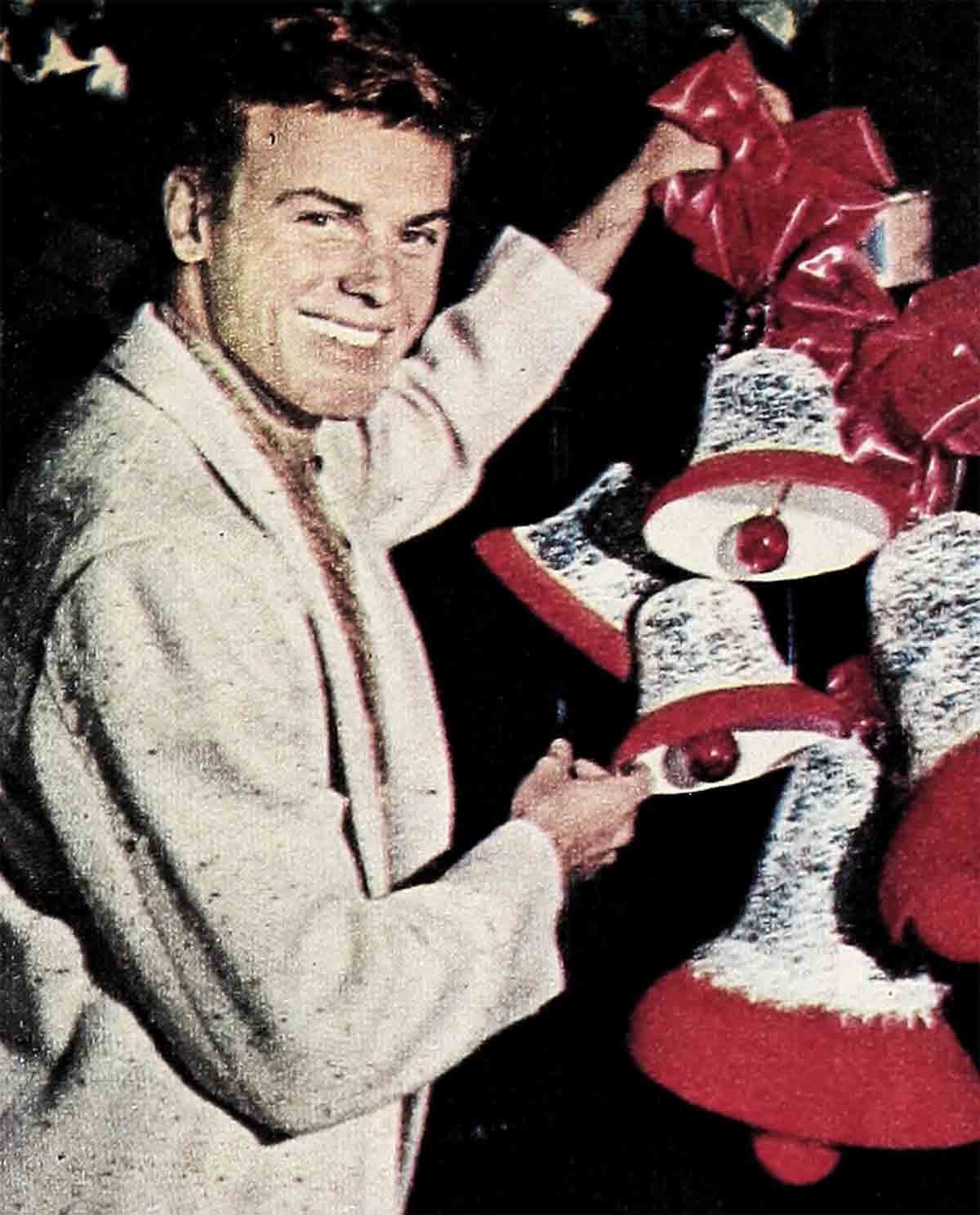
“I remember, too, the sound of the jingle bells going to church, all of us, to the tiny white church that was lighted only with candles. At bedtime, I slept under a great big homemade feather puff—everyone should sleep under a feather puff on Christmas Eve. I awoke so early the next morning that the stars were still shining and to the smells of fruitcake baking, applesauce cake, mince and pumpkin pies and walnut cake. Grandma and my aunts were up at five to start the baking.
“And Grandma telling me, ‘Eat up, child, you look poorly,’ as she continued to tell me, especially after I was in pictures. ‘When you’re the right size for pictures you’re the wrong size for your folks,’ she would scold and load me down with more cookies and candies. It was a Christmas I’ll never, no matter how old I am, ever forget.”
“Since the birth of my two youngsters,” says Janie Powell, “Christmas has naturally taken on new meaning, but I’ll never forget the Christmas morning I was five. We lived in Portland, Oregon—Mother, Daddy and I. I was excited. I couldn’t wait for Mother and Daddy to come down, so when it was barely dawn I crept down into the living room.
“The tree was beautiful and all the gifts prettily wrapped. The first to catch my eye was a package wrapped in silver, tied in silver and topped with a big silver bell. Feeling guilty, but not being able to wait any longer, I tore off the paper, ribbon and bell to look. Inside I found a small wooden box, brightly painted with delicate Swiss figures. The box was a maze of springs and cylinders all covered with glass. It was a music box which played ‘The First Nowell.’
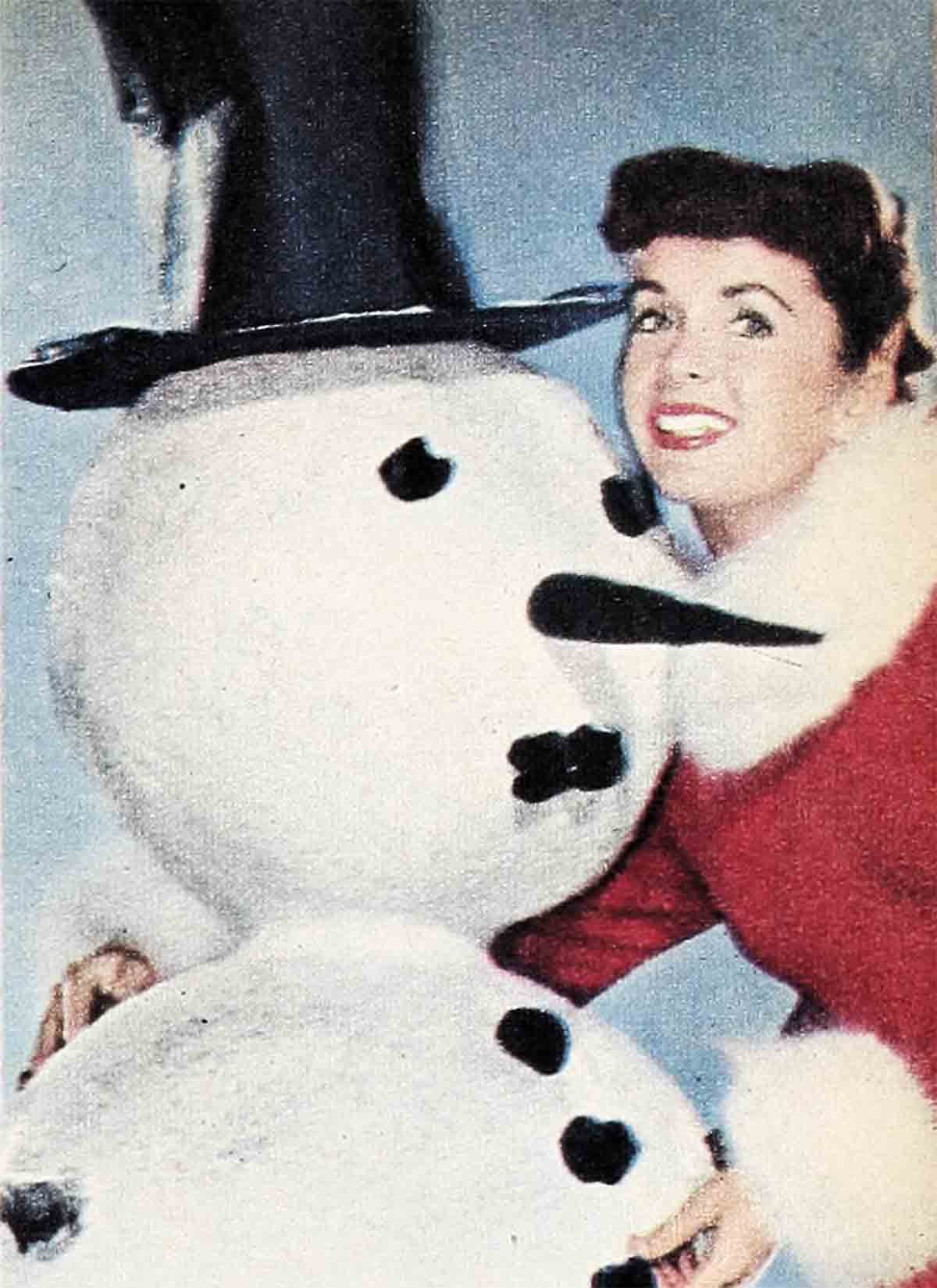
“That night when I went to sleep I took the music box with me. I kept it in my room for many years. In fact, I still have it put away with a doll that I’ve kept through the years. And when my little girl is five, I’ll rewrap it in silver paper, tie it with silver ribbon and top it with a big silver bell, and hope it will make her Christmas as happy and unforgettable as it did mine.”
“My first Christmas away from home was one I’ll never forget,” says Tab Hunter. “I was in the Coast Guard. I’d enlisted at fifteen and they hadn’t, as yet, found out that I was underage. On Thanksgiving Day I was sent on a thirty-day weather patrol. This meant I couldn’t return until after Christmas, but my mother insisted that I would be home. I kept writing that orders were orders, but she never gave up. Sure as shooting, she was positive I would be home to spend the holidays with her and my brother Walter, as I had every year of my life.
“Toward the end of December, we were in the middle of the Pacific and one of the men had an attack of appendicitis. The captain decided to return to port for an emergency operation. For a while I didn’t know whether we would make it by Christmas. I recall one night standing lookout watch and saying to myself, ‘One foot nearer home.’
“Well, to make a long story short, I arrived in Long Beach in a driving rainstorm, at five P.M., Christmas Eve. I had no money so I hitched up to Los Angeles and arrived just in time to open the Christmas presents with my family—just as my mother had been sure I would. They know, mothers do—somehow.”
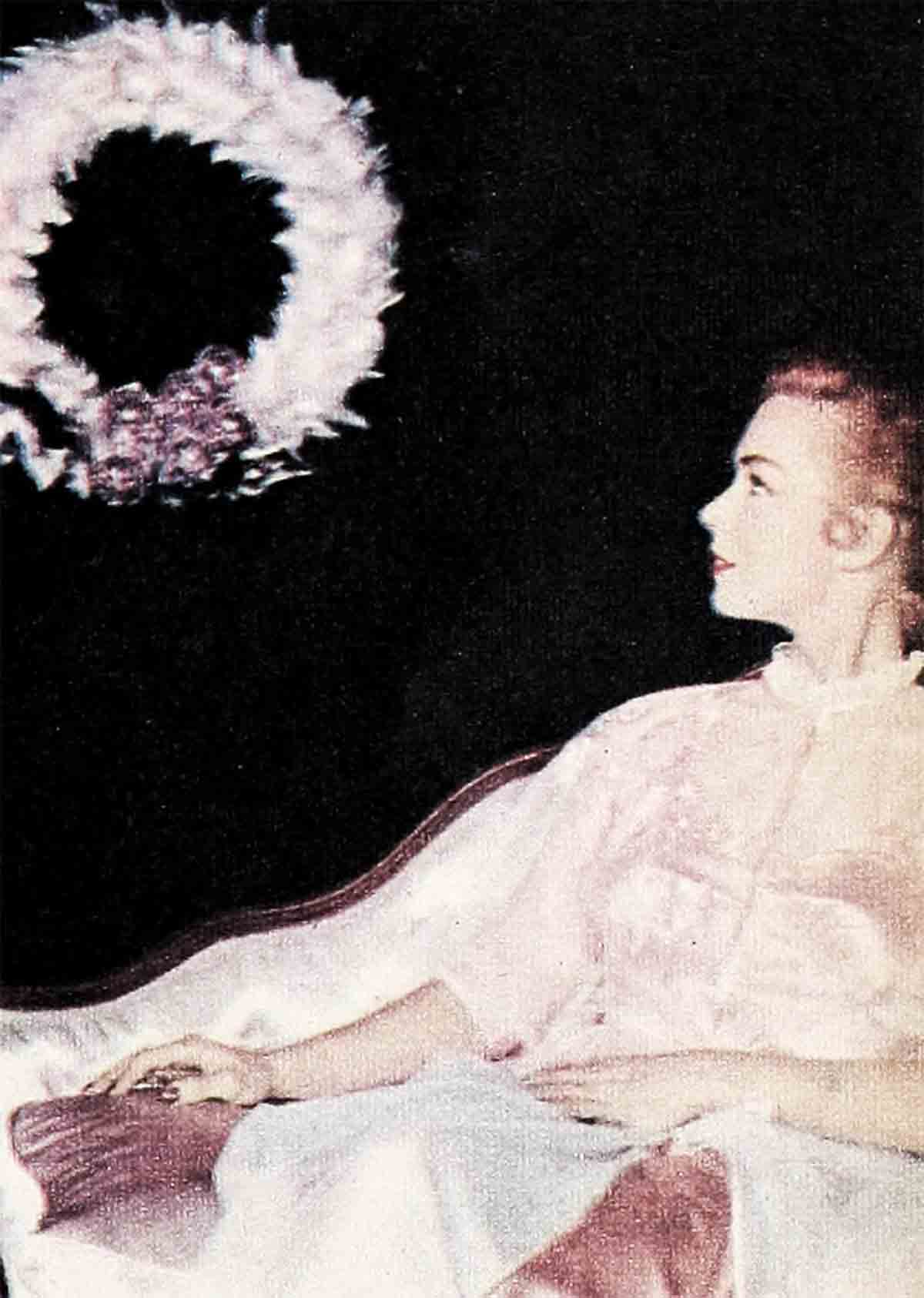
“When I was a little girl,” says Debbie Reynolds, “our whole family worked together to make Christmas a happy time. My brother Bill and I would decorate everything in sight from the big tall evergreen tree to the Christmas cookies. We loved to make wreaths of holly and mistletoe and hang them on the neighbors’ doors, then ring the bell and run. And we’d always hide nearby so we could see their reactions. I never quite realized, until the Christmas of ’fifty-two, when I was in Korea, why we did this.
“I didn’t truly appreciate the meaning of giving until I spent my first Christmas overseas for American servicemen. In the Far East orphans were brought in truckloads over snow-swept, wind-blown roads to the Army camps. I’ll never forget their faces when they saw the turkey and cranberries or when they heard the Christmas carols. And how busy our servicemen were in showing others the true meaning of Christmas by giving of themselves.
“One soldier in Seoul taught six little girls to sing ‘Silent Night’ by teaching himself the words of the song in Korean. Another GI helped some boys make a manger out of firewood.
“This is the Christmas I’ll never forget,” Debbie said. “I understood that no matter how small a gift, a carol sung, a drawing on a blackboard, a wreath of holly hung on a neighbor’s door—it makes the Christmas Star shine brighter. Ever since I’ve wanted to give something of myself, not only to my family and friends and,” Debbie twinkled, “to Eddie—but to people all over the world. Since I cannot do this, the best I can do is send a Merry Christmas wish to everybody, everywhere.”
And from all of us, too, a Merry Christmas to everybody, and especially to you.
THE END
—BY GLADYS HALL
It is a quote. PHOTOPLAY MAGAZINE DECEMBER 1955





No Comments